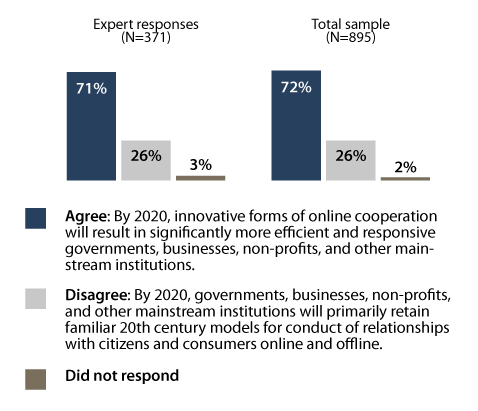An Internet Report from ten years ago
How the Internet has changed institutions by 2020… explained in 2010.
Exactly ten years ago, the Pew Research Center released a report on “The Impact of the Internet on Institutions in the Future”. Not the far future, mind you, but this year, 2020. So, today I summarize here some of “the major themes that emerged in the answers”, emphasizing the best bits. Enjoy!

All institutions will have to start listening more intently to their stakeholders. “Molecular democracy” and “Long Tail economics” are asserting themselves.
“Having been a senior executive at some of America’s largest corporations I am convinced that model is ultimately doomed. An entity that lasts forever and grows forever is just not possible and is silly anyway. It is a waste of resources… Wall Street does not improve productivity, the model is parasitic, transferring huge resources out of the system. I am looking forward to the next phase of the industrial revolution.”
“Active participation in political, health, and educational affairs will enable people to access relevant information to make informed choices and better decisions. Access to new media will give greater voice and empower increased public participation and representation in the future.”
“I have a very unhappy feeling about the future of governance. We have seen the rise of anti-democratic structures, most particularly the rise of stakeholderism as a kind of reversion of the discredited theories of the 1930’s that a person is valuable only in regard to the groups of which he is a member. Moreover, I find the erosion of our abilities to engage in critical thinking and non-inflammatory discourse to be disquieting. It seems as if electronic communications cause us to lose our ability to look past errors of expression and to treat one another as humans worthy of respect.”
“Crowdsourcing, blogging, and community participation are becoming the status-quo very quickly, because they provide such substantial advantages to those who take advantage of them. Better, faster, and more in-tune decision-making is just the beginning of it.”
Those with institutional backing and authority will not necessarily be able to wield the power they once enjoyed in the face of empowered amateurs.
Only the “time wealthy” will really have the ability to engage the institutions. The digital divide will especially matter in this realm.
The increasing interactivity of ICTs will exacerbate digital inequality.
“It is insane for government, industry (especially the health care industry) not to use technology to organize, maintain, and make use of large bodies of data. Amazon would be my model."
Last but not least…
(I particularly like this one, by Andy Oram):
“Widespread sharing of information and ideas will definitely change the relative power relationships of institutions and the masses, but they could move in two very different directions. In one scenario [this] may create movements for [positive]. In the other scenario, large institutions exploit high-speed communications and large data stores to enforce even greater centralized control, and use surveillance to crush opposition. I don’t know which way things will go… So I have to admit that in this area I tend toward pessimism.”
Executive summary:
Almost the only thing one can surely predict, in any moment, about how things will be “ten years from now” is that, barring a major collapse, what you predicted will still be readable online.
(This post was drafted in April 2020, but only put online in August, because… my coronavirus reports, of course
Who writes this, why, and how to help
I am Marco Fioretti, tech writer and aspiring polymath doing human-digital research and popularization.
I do it because YOUR civil rights and the quality of YOUR life depend every year more on how software is used AROUND you.
To this end, I have already shared more than a million words on this blog, without any paywall or user tracking, and am sharing the next million through a newsletter, also without any paywall.
The more direct support I get, the more I can continue to inform for free parents, teachers, decision makers, and everybody else who should know more stuff like this. You can support me with paid subscriptions to my newsletter, donations via PayPal (mfioretti@nexaima.net) or LiberaPay, or in any of the other ways listed here.THANKS for your support!